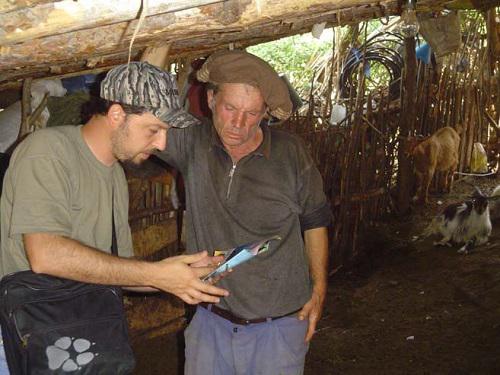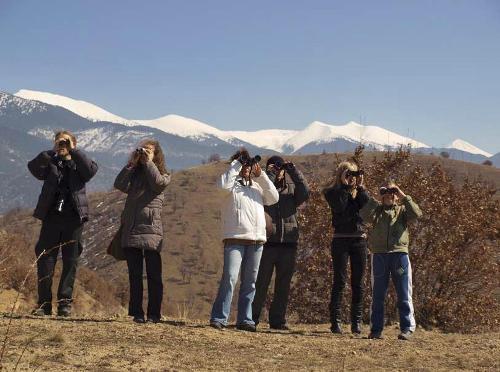Emilian Stoynov
Other projects
14 Aug 2001
Status Actualisation of the Large Birds of Prey on FYR Macedonia and Searching the Reasons for Decreasing Numbers
Continuing with the integrated work with livestock breeding for conservation and restoration of locally extinct populations of vultures and other conservation dependent species. Helping the local people to face their needs based on sustainable practices and to solve problems with predators. Finding, applying and promoting models for sustainable coexistence of people and wildlife.

Meeting shepherds.
During the implementation of the previous RSG the FWFF team provided measures to stop the illegal use of poisoned baits in the natural environment. A unique Compensatory Program for livestock damages caused by predators has been designed and established by the team. Damages compensation of one for one sheep has been provided. The FWFF established its compensatory herd of sheep and managed it by sustainable way, so to be able to compensate yearly about 30 sheep and this to be long lasting practice. But the team discovered that the compensation would not totally solve the problem as a single measure. The shepherds should be trained and new or return of the old traditional livestock management practices should be promoted and applied. The lack of experience in most of the local sheep owners causes easy access of the predators to their livestock.

The predators form the main problem for the livestock breeders in SW Bulgaria and East Macedonia. But the livestock losses caused by predators appeared also hundreds of years ago. Why now the problem is bigger? The truth is that the traditional defensive practices have been forgotten during the Communistic period. In that time the livestock breeding have been a state property and the wolves were almost extirpated thanks to the official and mass use of poisoned baits (mainly strychnine).
Now the livestock is returned to the private owners. They have not knowledge on how to keep the livestock and moreover how to protect it by predators. In the same time the ban of poisoned baits use according to the Bern Convention helped the wolf population number to grow. Today there are very good wolf population in Bulgaria and Macedonia as well as a lot of not experienced shepherds often loosing their livestock from predator attacks.
In 2005 the Fund for the wild Flora & Fauna (FWFF) has been granted Rufford Small Grant for the project “Development of the FWFF’s Compensatory Programme for Livestock Losses Caused by Predators and Restoration of the Transhumance as Traditional Nature Friendly Livestock Breeding Practice in Southwest Bulgaria and East Macedonia.” The project is in accordance with the most urgent measures necessary to be taken underlined in the Action Plan for recovery and conservation of vultures on Balkan Peninsula and adjacent regions (Balkan Vultures Action Plan). In the project activities were involved 15 FWFF’s members and activists. Also invited to participate were Strumyani Municipality, Pirin National Park and other local institutions and NGOs.